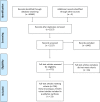Longitudinal Intergenerational Birth Cohort Designs: A Systematic Review of Australian and New Zealand Studies
- PMID: 26991330
- PMCID: PMC4798594
- DOI: 10.1371/journal.pone.0150491
Longitudinal Intergenerational Birth Cohort Designs: A Systematic Review of Australian and New Zealand Studies
Abstract
Background: The longitudinal birth cohort design has yielded a substantial contribution to knowledge of child health and development. The last full review in New Zealand and Australia in 2004 identified 13 studies. Since then, birth cohort designs continue to be an important tool in understanding how intrauterine, infant and childhood development affect long-term health and well-being. This updated review in a defined geographical area was conducted to better understand the factors associated with successful quality and productivity, and greater scientific and policy contribution and scope.
Methods: We adopted the preferred reporting items for systematic reviews and meta-analyses (PRISMA) approach, searching PubMed, Scopus, Cinahl, Medline, Science Direct and ProQuest between 1963 and 2013. Experts were consulted regarding further studies. Five inclusion criteria were used: (1) have longitudinally tracked a birth cohort, (2) have collected data on the child and at least one parent or caregiver (3) be based in Australia or New Zealand, (4) be empirical in design, and (5) have been published in English.
Results: 10665 records were initially retrieved from which 23 birth cohort studies met the selection criteria. Together these studies recruited 91,196 participants, with 38,600 mothers, 14,206 fathers and 38,390 live births. Seventeen studies were located in Australia and six in New Zealand. Research questions initially focused on the perinatal period, but as studies matured, longer-term effects and outcomes were examined.
Conclusions: This review demonstrates the significant yield from this effort both in terms of scientific discovery and social policy impact. Further opportunities have been recognised with cross-study collaboration and pooling of data between established and newer studies and international studies to investigate global health determinants.
Conflict of interest statement
Figures
Similar articles
-
Health professionals' experience of teamwork education in acute hospital settings: a systematic review of qualitative literature.JBI Database System Rev Implement Rep. 2016 Apr;14(4):96-137. doi: 10.11124/JBISRIR-2016-1843. JBI Database System Rev Implement Rep. 2016. PMID: 27532314
-
Participation in environmental enhancement and conservation activities for health and well-being in adults: a review of quantitative and qualitative evidence.Cochrane Database Syst Rev. 2016 May 21;2016(5):CD010351. doi: 10.1002/14651858.CD010351.pub2. Cochrane Database Syst Rev. 2016. PMID: 27207731 Free PMC article.
-
Systemic pharmacological treatments for chronic plaque psoriasis: a network meta-analysis.Cochrane Database Syst Rev. 2021 Apr 19;4(4):CD011535. doi: 10.1002/14651858.CD011535.pub4. Cochrane Database Syst Rev. 2021. Update in: Cochrane Database Syst Rev. 2022 May 23;5:CD011535. doi: 10.1002/14651858.CD011535.pub5. PMID: 33871055 Free PMC article. Updated.
-
Parent-training programmes for improving maternal psychosocial health.Cochrane Database Syst Rev. 2004;(1):CD002020. doi: 10.1002/14651858.CD002020.pub2. Cochrane Database Syst Rev. 2004. Update in: Cochrane Database Syst Rev. 2012 Jun 13;(6):CD002020. doi: 10.1002/14651858.CD002020.pub3. PMID: 14973981 Updated.
-
Interventions for promoting habitual exercise in people living with and beyond cancer.Cochrane Database Syst Rev. 2018 Sep 19;9(9):CD010192. doi: 10.1002/14651858.CD010192.pub3. Cochrane Database Syst Rev. 2018. PMID: 30229557 Free PMC article.
Cited by
-
Nepal Family Cohort study: a study protocol.BMJ Open. 2024 Nov 9;14(11):e088896. doi: 10.1136/bmjopen-2024-088896. BMJ Open. 2024. PMID: 39521464 Free PMC article.
-
Queensland Family Cohort: a study protocol.BMJ Open. 2021 Jun 24;11(6):e044463. doi: 10.1136/bmjopen-2020-044463. BMJ Open. 2021. PMID: 34168023 Free PMC article.
-
Stop, think, reflect, realize-first-time mothers' views on taking part in longitudinal maternal health research.Health Expect. 2019 Jun;22(3):415-425. doi: 10.1111/hex.12861. Epub 2019 Feb 21. Health Expect. 2019. PMID: 30793449 Free PMC article.
-
A systemic review of maternal wellbeing and its relationship with maternal fetal attachment and early postpartum bonding.PLoS One. 2019 Jul 25;14(7):e0220032. doi: 10.1371/journal.pone.0220032. eCollection 2019. PLoS One. 2019. PMID: 31344070 Free PMC article.
-
Illawarra Born cross-generational health study: feasibility of a multi-generational birth cohort study.Pilot Feasibility Stud. 2019 Feb 26;5:32. doi: 10.1186/s40814-019-0418-5. eCollection 2019. Pilot Feasibility Stud. 2019. PMID: 30834141 Free PMC article.
References
-
- Coe CL, Lubach GR. Fetal Programming: Prenatal Origins of Health and Illness. Current Directions in Psychological Science. 2008;17(1):36–41.
-
- Godfrey KM, Barker DJP. Fetal programming and adult health. Public Health Nutrition. 2001;4(2b):611–24. - PubMed
Publication types
MeSH terms
LinkOut - more resources
Full Text Sources
Other Literature Sources
Miscellaneous


